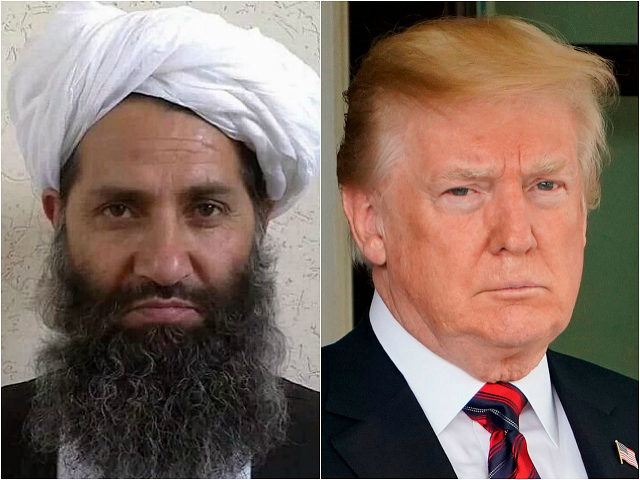The Afghan Taliban chief, Hibatullah Akhundzada, renewed calls this week for direct discussions with the United States to end the nearly 17-year-old war — this time in a statement personally signed by the leader stressing that the withdrawal of “occupying forces” is the “only path” towards peace.
On Tuesday, the Taliban leader declared:
The only path to rescuing ourselves from all these calamities is for all American and other occupying forces to leave our country and for an independent, Islamic, intra-Afghan government to take root. Our Jihad began for this exact purpose and in conjunction to our armed Jihad, we have kept the doors of understanding and negotiations open to reach this objective and appointed the Political Office of the Islamic Emirate as the exclusive avenue of activity in this regard.
If the American officials truly believe in a peaceful end to the Afghan imbroglio, then they must directly present themselves to the negotiation table so that this tragedy [invasion] the destructive effects of which mainly harm the American and Afghan people can be resolved through talks.
For years, the Taliban has maintained the complete withdrawal of U.S.-NATO forces as a precondition for peace negotiations, but America has refused to abide.
The Taliban argues that talking to Kabul is a waste of time because the Americans are the ones really pulling strings in Afghanistan, often dismissing the Afghan government as only a puppet.
Although the Taliban has long rejected peace negotiations, the prospects for talks have intensified in recent months.
Just in March, the Taliban has expressed a desire to have discussions with the U.S., instead of Kabul, about ending the nearly 17-year war in Afghanistan.
Afghan war experts like Laurel Miller, the former U.S. State Department acting special representative for Afghanistan and Pakistan now at the Rand Corporation, criticized the Trump administration for not making clear what it is willing to put on the table to convince the Taliban to come to the peace talks table.
In February, the Afghan president proposed to the Taliban a ceasefire and recognition as a legitimate political group, an offer that the Taliban appeared to refuse when it announced its spring offensive soon after Ghani announced the proposal.
However, the Taliban chief himself seemed receptive to Ghani’s offer, echoing Kabul-based analysts like Rahmatullah Amiri, a Taliban researcher at the Kabul-based Liaison Office (TLO) who emphasized that the terrorist group wants political power.
Taliban leader Akhundzada proclaimed in Tuesday’s statement:
The only path to rescuing ourselves from all these calamities is for all American and other occupying forces to leave our country and for an independent, Islamic, intra-Afghan government to take root. Our Jihad began for this exact purpose and in conjunction to our armed Jihad, we have kept the doors of understanding and negotiations open to reach this objective and appointed the Political Office of the Islamic Emirate as the exclusive avenue of activity in this regard.
Although the United States initially invaded Afghanistan in 2001 to overthrow the Taliban regime, the Trump administration now supports Afghan President Ghani’s offer of a ceasefire and legitimate political recognition to carry out their activities peacefully, potentially gaining control of the country again.
Various analysts, including Hekmat Khalil Karzai, the deputy foreign minister of Afghanistan, described Ghani’s deal as “unprecedented.”
Some experts at a U.S. Institute for Peace discussion on Afghan peace last week suggested absorbing the Taliban fighters into the country’s military as militias.
Voice of America (VOA) acknowledges that the new statement dashed hopes and assertions by the U.S. military that the Taliban had recently expressed an interest in at least considering to engage in a peace dialogue with the Kabul government.
As early as last week, U.S. President Donald Trump’s administration, consistent with its predecessors that have presided over the Afghan war since it started in October 2001, said via Lisa Curtis, a key adviser to the American commander-in-chief, that America “is ready to participate” in the talks but refuses to “serve as a substitute for the Afghan government and the Afghan people.’
Some news outlets, namely Daily Pakistan, described new Taliban offer negotiation talk request as “unprecedented” as well.
While initially ignoring Kabul’s U.S.-NATO-backed unilateral ceasefire made on June 7, three weeks after the start of the holy month of Ramadan on May 17, the Taliban relented and offered its terms.
The Taliban proposed a truce for three days over the Eid al-Fitr holiday, expected to start this weekend. Taliban terrorists excluded U.S.-NATO forces from the ceasefire, which remains uncertain if it will hold since attacks have continued since its announcement.
With less than a week left in Ramadan, the Taliban has proven to be the deadliest group during the Muslim holy month when jihadists consider God to majorly reward those who die a martyr.

COMMENTS
Please let us know if you're having issues with commenting.